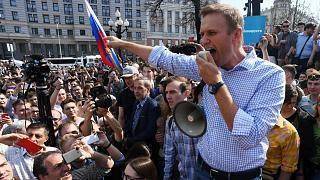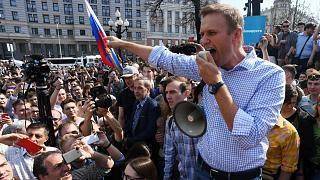Russian opposition leader Alexei Navalny confirmed he will return to Russia today, Sunday, after several months in Germany recovering from an alleged poisoning, despite the possibility of arrest by Russian judicial authorities.
More than 2,000 people announced on Facebook that they intend to attend and welcome Navalny, but the judiciary warned against participating in any "unauthorized public event" at Vnukovo Airport. The airport administration stated it would not allow media access to the stands due to the ongoing COVID-19 pandemic.
It is noteworthy that Russian President Vladimir Putin, earlier participating via video in the Valdai Discussion Club events, demanded evidence of the alleged poisoning of the prominent opposition figure Alexei Navalny, marking his first public comment on the incident. Putin added that he personally asked the prosecutor's office to allow Navalny to leave, despite existing restrictions on the 44-year-old opposition figure, implying that if authorities wanted to poison someone, they would not have sent the victim to Germany for treatment.
The story of the 44-year-old Navalny began on August 20, when he experienced severe illness during a flight back from Siberia to Moscow as part of an election campaign. He was hospitalized in Omsk for 48 hours before being transferred to Berlin in a coma after pressure from his associates.
Navalny was released from the hospital in early September, and three European laboratories concluded he had been poisoned with Novichok, a substance developed during the Soviet era for military purposes. This conclusion was supported by the Organization for the Prohibition of Chemical Weapons, despite Moscow’s repeated denials.
Since Navalny announced his intention to return to the country on Wednesday, the Russian Federal Penitentiary Service warned him that it would be "obliged" to arrest him for violating the terms of a suspended sentence issued in 2014. However, Navalny dismissed this as an attempt to "intimidate" him and instead called on his supporters to come to Vnukovo Airport in Moscow, where his plane is scheduled to arrive at 7:20 PM local time.
Navalny claims that Russian security services plotted to assassinate him under direct orders from Vladimir Putin. Moscow denies the poisoning entirely despite European laboratory results proving he was poisoned, calling the narrative a Western conspiracy and questioning the opposition leader's healthy lifestyle.
It is important to note that Russia refuses to open a criminal investigation into what happened to Navalny, arguing that Germany is unwilling to share its findings with Russia. However, Germany announced on Saturday that it sent most of the investigative elements related to Navalny's alleged poisoning to Moscow, which includes interrogation transcripts from German investigators as well as blood and tissue samples and pieces of clothing.




